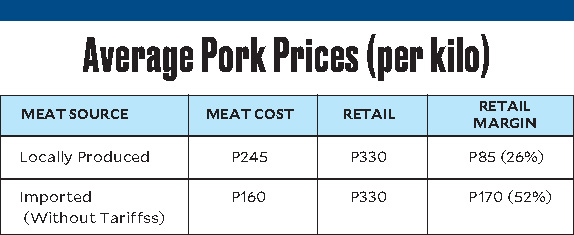Disconnect between agriculture direction and implementation
For agriculture, there is an alarming disconnect between President Marcos’ direction to prioritize development versus the National Economic Development Authority’s (Neda) Dec. 16 decision to extend the lowered tariff rates for key commodities until the end of next year.
At a Dec. 21 meeting of the Alyansa Agrikultura (AA), the group’s president Arsenio Tanchuling described this as an agency’s betrayal of a presidential promise of support. AA executive vice president Elias Jose Inciong identified it as “policy capture”—because an agency has been captured by the vested interests of importers at the expense of agriculture producers. The AA unanimously and strongly opposed this Neda move.
The original decision was to decrease tariff rates of certain agriculture commodities, intended to decrease inflation, until December this year. They are as follows: (1) for rice outside Asean, from 40 to 50 percent to 35 percent; (2) for corn, from 35 to 50 percent to 5 to 15 percent; and (3) for pork, from 30 to 40 percent to 5 to 15 percent. However, consumer retail prices for these products hardly decreased.
In the end, importers kept most of the profits from the decreased tariffs, the farmers suffered lower incomes and consumers paid practically the same retail prices.
This phenomenon of unreasonably low tariffs resulting in unfavorable consequences was seen when the Rice Tariffication Law was implemented. Farmer incomes decreased by 23 percent to 25 percent, while consumers saw only a 2 to 3 percent decrease in rice retail prices.
Problematic premise
There is a severely mistaken assumption that temporarily lowering tariffs beyond what would be the appropriate rate will automatically result in significantly lower retail prices (thus decreasing inflation). This has been repeatedly proven wrong.
In addition, there are two devastating consequences. First, farmers experience decreased incomes because they have to compete against unfairly cheaper imports. Second, local production will decrease and investments for agriculture development will be discouraged because of an unfavorable policy environment that favors importation over domestic production.
Price is not determined primarily by cost, but by supply and demand. As a hypothetical example, if an importer decreases his cost because of a tariff savings reduction of P50, but can still sell his product at P5 less because of supply and demand factors, he will keep the remaining P45.
This was what happened with the tariff reduction originally planned to end this year. Consider the actual pork prices, submitted last Nov. 11 by Rolando Tambago of the Pork Producers Association of the Philippines, to the Tariff Commission. (See table above).
At the current tariff rates of 5 percent (for minimum access volume) and 15 percent (for the rest), importers and traders have been keeping most of the profits from the tariff reduction. Their import costs are at P168 and P187, respectively. Despite this, retail prices have hardly changed. Worse, they have caused significant losses for our producers, 65 percent of whom are backyard producers.
Finally, lower tariffs have resulted in billions of foregone government revenues, which went to importers and traders instead of to producers who urgently need the support.
Continued importation
At the original tariffs of 30 percent and 40 percent, the import costs would increase to P208 and P224, respectively, still below the local producers’ cost of P245. Therefore, importers will continue to import. We will not see a significant increase in retail prices because of supply and demand. Consumers will not be harmed. Farmers, who are also consumers, will continue producing and investing, because the government will be seen as champions of agriculture development.
With unfair importation, our production will decrease and we will become dangerously dependent on uncertain imported supply, making prices volatile. We will be the victims of regulatory capture; our food security will be in peril.
We now need the necessary connect between agriculture development and implementation. The appropriate tariffs must be implemented to actualize Mr. Marcos’ stated policy of prioritizing domestic production over importation. This is an absolute necessity for both consumers and producers. Merry Christmas!
The author is Agriwatch chair, former secretary of presidential flagship programs and projects, and former undersecretary of the Department of Agriculture and the Department of Trade and Industry. Contact is agriwatch_phil@yahoo.com.

